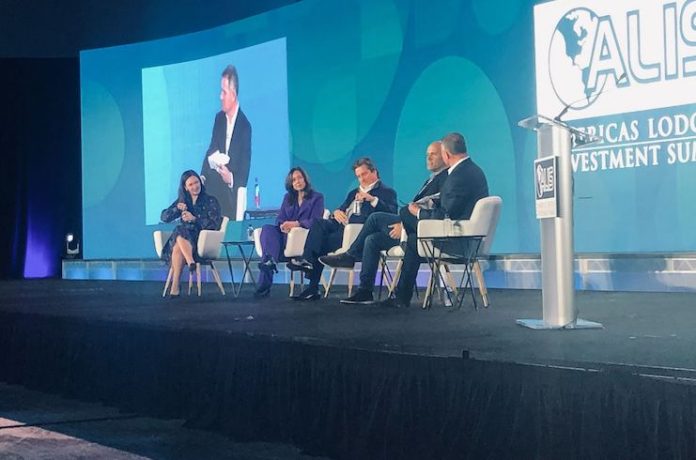LODGING is live from ALIS 2024, brought to you by Choice Hotels. Access more of our live coverage here.
The keynote panel at ALIS brought together executives from a variety of different segments of the travel industry to address some of the current trends and potential challenges to further growth and a key focus of the discussion was leisure and international travel.
The panel, entitled “State Of The Travel Industry,” was moderated by Geoff Freeman, President/CEO, U.S. Travel Association, who described the objective of the panel as to provide “a broader perspective and look at the travel industry.”
Danielle Bozarth, senior partner, McKinsey & Company, provided a positive backdrop by talking about some of the company’s recent consumer findings, in particular, pointing to a robust leisure market.
“We continue to hear people saying that they’re excited to travel; they’re going to continue to shift their spend from products to experiences. It’s not as good to be a retailer in America right now as it is to be a travel company and I think we see all evidence that that’s going to continue,” he said.
Bill Hornbuckle, CEO & President, MGM Resorts International, reinforced the point.
“Leisure demand is at all-time high and it continues into this year,” he said.
Freeman, however, did provide some more sobering statistics based on recent association forecasts, pointing out that “leisure travel is still moderating.” He further noted that business travel and international inbound travel to the U.S. are both “struggling to get back to pre-pandemic levels.”
Freeman elaborated on some of the international obstacles.
“We released a report last week that showed that the U.S. is ranked 17th of the top 18 global destinations in terms of competitiveness. Travelers are not choosing to come to the United States, while other countries like Canada, the U.K., and even China, are putting in place policies to be far more competitive when it comes to attracting travelers,” he stated.
Peter Kern, vice chairman & CEO, Expedia Group, suggested that “we’re still working our way to what the new normal is” when it comes to post-COVID international travel patterns.
“What we observed is there were a lot of people who didn’t travel or weren’t comfortable traveling internationally in ‘22 that could finally go. So everyone went back to Europe. If you were in Europe last summer you know it was all Americans everywhere all the time. I think that will normalize. That’s why you may have seen the dip in the U.S. and it wasn’t countered by Asian travelers and others, many of whom still couldn’t come to the U.S.,” he said.
Hornbuckle, for his part, noted that the cost of labor and union contracts remain a major concern going forward. To that point, he went on to highlight how the casino business has evolved in recent years noting that some 70 percent of top-line revenue for MGM is non-gaming.
“While we’re in the casino business, it’s not what drives the boat anymore, it is everything else. So when you put that wage pressure and all the other inflationary pressures on it, there’s margin pressure. We’re a publicly traded company so it’s always a concern,” he said.
Finally, Kern talked about his perspective on the ongoing evolution of the relationship between the OTAs and the hotel community.
“For us, it’s better than it’s ever been. I think with the chains, with the hotels themselves, and with owner-operators we have made a concerted effort to be more than simply another channel to sell your product. We’ve done a lot of work to really change how we’re perceived, what our role is, and how we provide technology to the industry. Even how we try to find solutions to industry-wide problems like wholesale rate issues, which we’ve worked with many large chains on. We continue to work on those kinds of solutions,” he noted.













